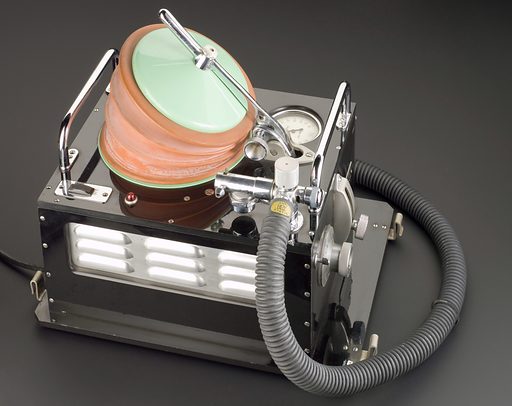Healthcare
Hospital Faces Ventilator Shortage Amid Virus Hospitalization Surge

Portable ventilator, the 'Beaver II', England, 1955-1965. Intended for use by hospital patients whose lungs were paralysed, this machine was introduced in the wake of the 1952 polio epidemic in Copenhagen, Denmark. Air or oxygen was delivered to the patient via a rubber concertina reservoir bag, which was regularly compressed by a small electric motor. Polio is a virus that affects the central nervous system and can paralyse the muscles throughout the body. When it affects the muscles in the chest, a person cannot breathe on their own. Made by The British Oxygen Co Ltd, this portable model was used at Darlington Memorial Hospital in Yorkshire, England. Contributors: Science Museum, London. Work ID: qwafgsbq.
Missouri hospitals saw a surge in COVID-19 cases over the July 4 weekend, which caused a ventilator shortage, according to hospital officials, the Associated Press reported.
CoxHealth and Mercy Springfield have treated 213 COVID-19 patients as of Monday, which is up from 169 on Friday, according to the AP. The surge in COVID-19 hospitalizations is partially due to the low vaccination rate in the neighboring counties around Springfield.
The majority of COVID-19 cases in the Springfield area have been the new Delta variant, leading to increased hospital admissions, CoxHealth spokesperson Kaitlyn McConnell told the Daily Caller News Foundation.
Only 29.3% of residents in one of Springfield’s neighboring counties have had their first round of vaccinations, compared to the state rate of 44.7% and the national rate of 54.7%, according to the AP.
“After what we’ve seen in the last month, everyone is just holding their breath, especially after a holiday weekend like this, knowing that there were large gatherings,” Chief Administrative Officer of Mercy Springfield, Erik Frederick, told the AP.
“We put one right into service, and we have about 14 on standby right now. When we look at our census of 115 patients, about 85 of those patients right now are on some kind of mechanical ventilation support. That’s pretty scary,” said Frederick.
The ventilator shortage is so dire, Frederick asked over Twitter for respiratory therapists to contact the hospital.
115 COVID+ @MercySGF. Running almost 50 vents now. We are expanding to 2nd COVID ICU and a 2nd step down. Physicians, nurses and respiratory therapists are tired. Heck everyone is tired. Travel RN’s coming this week. Physician support being arranged. If you’re a RT, call us.
— Erik Frederick (@CAOMercySGF) July 5, 2021
CoxHealth saw a considerable spike in COVID-19 patients but did not need additional ventilators, McConnell told the DCNF.
“We are distressed by the high number of hospitalizations throughout southwest Missouri related to COVID-19,” she said.
“At CoxHealth, this number remained around 100 for the last week. We are currently at 94 inpatients with COVID across our system,” McConnell said.
CoxHealth has experienced a nurse shortage causing the hospital to transfer patients, McConnell said.
“While we have ample supplies and space to care for additional patients, staffing remains a challenge,” she said.
“At our high of around 170 COVID patients last winter, we had approximately 280 traveling staff to help augment our workforce. The lower number of hands available to help is coupled with higher volumes in other areas of the health system, which we are committed to continuing so other critical patient care is not again deferred,” McConnell told the DCNF.
CoxHealth is working to bring back traveling nurses and hire additional staff but is facing challenges as travelers are usually unavailable during this time of year, McConnell told the DCNF. At least 12 patients were temporarily transferred from CoxHealth to nearby hospitals until the hospital could hire more staff.
COVID-19 cases are projected to increase throughout the summer, according to Frederick.
“Unfortunately we are living in a region where the vaccine has not been adopted. It has not been accepted and here we are with hospitals full of COVID patients,” Frederick said.
All content created by the Daily Caller News Foundation, an independent and nonpartisan newswire service, is available without charge to any legitimate news publisher that can provide a large audience. All republished articles must include our logo, our reporter’s byline and their DCNF affiliation. For any questions about our guidelines or partnering with us, please contact [email protected].

